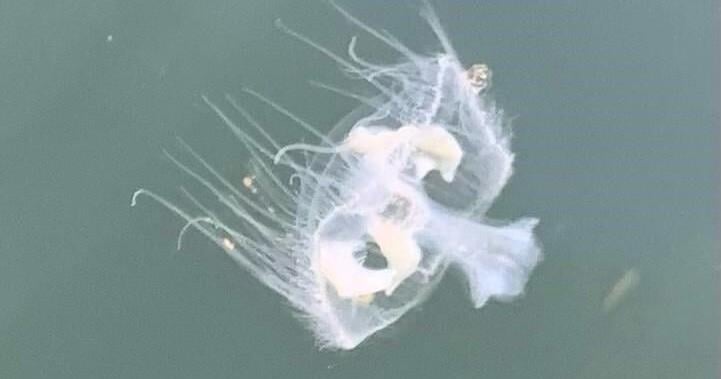VANCOUVER – Some time more than 30 years ago, a single Chinese peach blossom jellyfish made its way into a lake in British Columbia.
Exactly how it arrived is not clear, researchers say — perhaps it was in aquarium water — but decades later, thousands of genetic clones of the same organism have been spotted in 34 waterways around the province.
Scientists are now trying to understand the impact of the gelatinous invaders, that are about the size of a quarter.
Evgeny Pakhomov, a University of British Columbia biological oceanographer studying the phenomenon, said in an interview that the actual numbers of the jellyfish were unknown, but sightings could increase rapidly in coming years due to a warming climate.
“This species actually thrives in the water which is more than 27 degrees Celsius. It’s really likes that kind of warm water,” he said, noting they only become observable around 25 degrees Celsius.
Pakhomov said the risk was a huge explosion in their numbers — called a jelly bloom — with the potential to disrupt ecosystems and fisheries, as well as to make for unpleasant swimming.
Their spread could threaten indigenous species by outcompeting them, he said, consuming the plankton that juvenile salmon or trout feed upon.
Peach blossom jellyfish originate in rivers and freshwater systems in China but have been turning up in other regions for centuries. Pakhomov said the earliest documented case occurred in France during the building of the Palace of Versailles in the 17th century, when waterlilies were imported from China for the palace ponds.
“A couple of years later, they started noticing jellyfish in those ponds in France, and then it was spreading all over the world,” he said. “It’s now essentially in every continent except Antarctica.”
Pakhomov, who also serves as a University of British Columbia professor in the Department of Earth, Ocean and Atmospheric Sciences, said the phenomenon was largely unstudied in British Columbia until about five years ago when his team decided to start analyzing the creatures.
Their research, published last month in the Canadian Journal of Zoology, says peach blossom jellyfish have been reported in B.C. since 1990, mainly in the Lower Mainland, on Vancouver Island, around the Sunshine Coast and more recently, as far inland as Osoyoos Lake.
As of 2023, there had been 85 sightings, meaning they were spotted in a separate location or year, although each sighting could represent one or thousands of jellyfish.
After analyzing their genetic makeup, Pakhomov said his team made an interesting discovery.
“They look like clones although we collected them from different places, so obviously, at some point, there was one introduction,” he said.
He said researchers speculate that the fateful introduction was likely due to aquarium trade with another nation, either China or another country where the species had already been introduced.
Pakhomov said there are two ways that the jellyfish can reproduce: asexually and sexually. Because the genetic material of the jellyfish they have studied shows they are all male clones, he said researchers determined they were all products of asexual reproduction.
The lack of females means the males can’t complete sexual reproduction.
“I don’t know whether or not the conditions are such that females do not develop or only male polyps (a stage of the jellyfish life cycle) are being introduced into the systems and then kind of spread widely,” Pakhomov said, raising the possibility that certain water temperatures may only allow for one sex to develop.
Pakhomov hypothesized that the jellyfish were being spread to different bodies of water by boating practices or by birds. He said if researchers were able to it figure out how, they might be able to predict when and where they appear next.
He said his team’s goal was to properly map the distribution of the jellyfish in B.C. and better quantify their impact on freshwater ecosystems and fish populations.
He stressed the importance of so-called citizen science, where people collect data and report sightings. If more people knew to report sightings of the jellyfish, “we would be able to map distribution of the species much better.”
This report by The Canadian Press was first published Sept. 11, 2024.


































